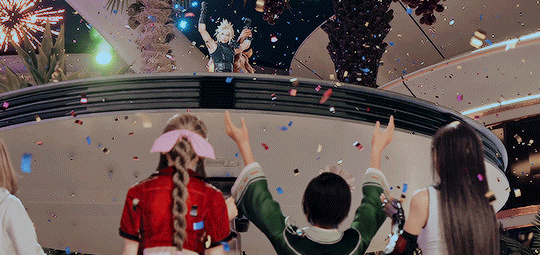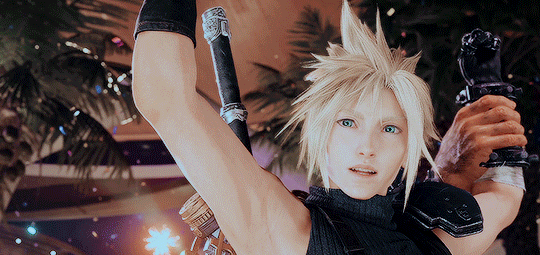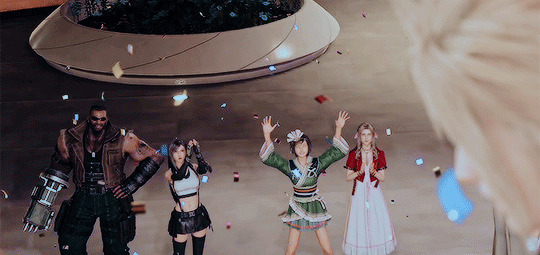Text
Part 2: Seventh Heaven [A Complete Analysis of Final Fantasy VII]

Welcome to part 2 of my complete analysis of Final Fantasy VII. I am writing these posts as one long rumination under the assumption that you have read the prior chapters. So if you are new here, before proceeding further please see this master link.
Last time, we were introduced to “Flower Girl”, the external plot heroine, and briefly touched on the game’s overarching theme of life. Juxtaposed within this theme are the forces of science and nature, as explored through AVALANCHE – the red herring ‘savior’ of the Planet. Hired by AVALANCHE was “Ex-SOLDIER” Cloud - the epitome of strength. This chapter will begin the long delve into his backstory and driving force, where we meet the heart and heroine of the internal plot.
Keep reading
45 notes
·
View notes
Text
It's actually borderline irritating to see some people assuming that anyone who're into Cloud/Tifa are defensive about the pairing because they're into the whole idea of first love = someone's one and only love.
I don't believe in this at all, so I don't see any value in the trope. We love(d) many different people throughout our lives and this reality has been reflected in many fictional narratives - FFVII is not an exception.
Cloud/Tifa is the pairing for me because of how they keep choosing one another, despite every single thing that had/could have kept them apart.
Cloud leaving their hometown to join Shinra; their hometown burning down; Cloud's identity crisis; their trauma; Cloud's obvious interest in Aerith; Sephiroth's manipulation of them both; Tifa's loss of faith in Cloud; Cloud's breakdown and 2nd mako overdose; the world nearing its end because of meteor; their communication breakdown post-OG; Cloud leaving their home because of geostigma and depression. All of this served to pull them away from one another, yet they still chose one another. They still gave each other chances. They still have each other's backs. They still returned home, wherever this is doesn't matter as long as they're spending their lives together.
Cloud/Tifa is in a class on its own as a fictional pairing. Their story walks us through multiple phases of their relationship, where at some moments of low, it seemed as though they're going to break, only for everything to end with them still together because they came through together. If this isn't what unconditional love looks like, then what is?
What other fictional pairing in a video game series is depicted the way Cloud/Tifa is? None!
#ffvii#tifa lockhart#cloud strife#honestly I ship Tifa with other characters but even in my imagination I can't picture her loves anyone else but Cloud#Tifa chooses that dude#what more can I say
40 notes
·
View notes
Text
Aerith and Tifa as Sephiroth’s Foils
There are a lot of moving pieces to Final Fantasy 7–something that has historically contributed to its infamous reputation of being confusing. But one consistent thematic pattern that FF7 utilizes is duality. Life and death. Meetings and partings. Loneliness and togetherness. Many of the main themes presented in FF7 fall into this same format. Even the characters can be considered dualities in and of themselves. One of the most obvious dualities in the game is that of Aerith and Sephiroth. However, in varying degrees, all of the main characters are in some way antithetical to Sephiroth.
Like in many other classic hero vs. villain tales, you’d think that Cloud is the perfect foil to Sephiroth–after all, they’re at odds, so it would make sense that they’d be opposites. However, what makes Cloud and Sephiroth’s conflict so fascinating is that they actually have a good amount in common. Both Cloud and Sephiroth struggle with their identities. They also experienced trauma and loneliness in the past, and tended to isolate themselves from others. It’s this commonality that actually makes them compelling rivals, as Cloud not only has to battle Sephiroth, but also the aspects of Sephiroth that Cloud himself struggles with.
The real foils of Sephiroth are Aerith and Tifa. While there is some debate as to whether Aerith or Tifa is the real heroine of FF7 (mostly spear-headed by weird LTD-pushers), the big-brained answer is that they’re both the heroines. This is evident in concept art from an older FF7 Ultimania, pictured below:
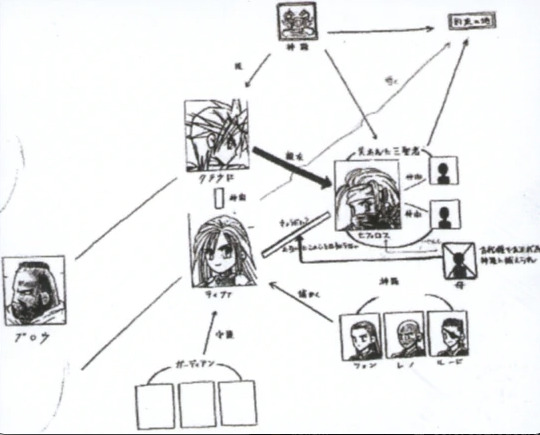
As you can see, the concept for the story’s heroine started out as a hybrid of Tifa and Aerith. The character’s design resembles Tifa, and the name below the sketch reads “ティファ”, or Tifa. However, the character’s role was very different. She was intended to be both the childhood friend of Cloud Strife and a Cetra, the sister of Sephiroth (who originally looked more like Vincent). Eventually, the idea to kill off one of the main characters was introduced, and the role of the heroine was split in two: the Cetra, Aerith, and the childhood friend, Tifa. There is some evidence of the original concept still present in the series; Tifa’s iconic red eyes match Vincent’s, because originally, the two characters were designed to be siblings before eventually going to separate roles.
Based on this evidence, it would seem logical that both Aerith and Tifa retained their dualities with Sephiroth. And, indeed, even in the final product, both characters provide a foil for Sephiroth to balance the scales.
To exemplify the dynamic that Cloud, Tifa, Aerith, and Sephiroth have with one another, I’ve drawn a (crude) spectrum:
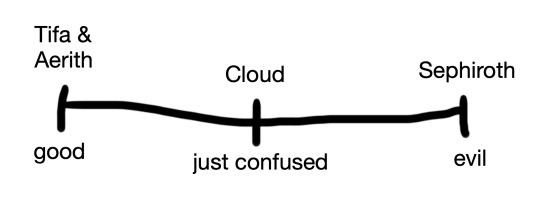
Obviously, Aerith and Tifa play different roles and have different importance to the story. Aerith’s role is more “big picture”, so to speak. She is responsible for the Planet and for protecting it from Sephiroth after discovering his plans to destroy it. Tifa’s role is more fine-tuned and detailed. She is the rock and the only stable element of the Nibelheim story, a key part of Cloud, Zack, and Sephiroth’s backstories. To understand how each of them foils Sephiroth, we have to look at them individually and analyze how they interact with both Sephiroth and Cloud.
Part I: Aerith as Sephiroth’s Foil
As stated above, Aerith’s role as foil is a little more obvious. Sephiroth and Aerith are both “Cetra”–or, at the very least, they both claim to be. For Sephiroth, his identity as a Cetra is tied to his belief that Jenova, his “mother”, was a Cetra who was betrayed by humanity when humans left the traditional Cetra nomadic lifestyle in order to colonize the land and the Planet.
However, Jenova was not a Cetra at all–she was actually a “calamity from the skies” that crashed down and created the Northern Crater two thousand years before the events of FF7. After encountering the Cetra, the creature known as Jenova began infecting and killing the Cetra one by one. These killings only stopped when the Cetra banded together to seal Jenova in the Northern Crater; but, by the time it was done, the Cetra were dying off.
So how did Jenova become known as a Cetra? That seems like more than a clerical error to me. It was actually Aerith’s father, Professor Gast, who uncovered Jenova from the Northern Crater and mistakenly identified her as a Cetra. The Shinra Corporation, desperate to find the Cetra’s “Promised Land” thinking that it would be rich in Mako energy, enlisted the professor to find a way to create a Cetra from a human specimen. Using the cells extracted from Jenova, Sephiroth was created, and after reading Shinra’s archives, he discovered his relationship to Jenova and embraced his identity as “Cetra”.
Aerith, on the other hand, really is a Cetra. Her mother, Ifalna, was the last Cetra–making Aerith, by relation, half-Cetra. Her connection to the Cetra race is real, unlike Sephiroth’s.
This give her declaration in the final chapter of FF7 Remake all the more important:
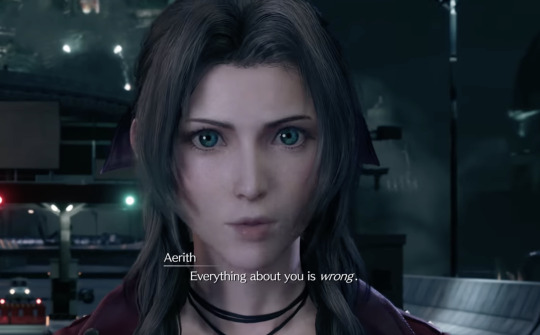
There’s a duality between Aerith and Sephiroth in truth versus lies. Aerith’s heritage as a Cetra is founded in truth. She is connected to the Planet in a way that is real. She is a Cetra, in covenant with the Planet to protect it that was passed down to her by her mother. In contrast, Sephiroth’s claims to be a Cetra are lies–whether he’s aware of it or not. Jenova, Sephiroth’s “mother”, is not a Cetra. She is not even from the Planet, but rather from somewhere beyond it. Jenova acted as a parasite of the Planet and is actually responsible for sending it into chaos and draining it of its life. He has no real obligation to protect the Planet, and he is not truly connected to it the way that Aerith is.
Aerith and Sephiroth also represent the original duality between the Cetra and Jenova, with both parties continuing to be at odds with one another even two thousand years later.
Tying in a more overarching FF7 theme, Aerith and Sephiroth also personify the duality of life and death, respectively. With Aerith, her “domain” of sorts, the Sector 5 church, is bursting with life. It is the only place in Midgar where flowers will grow. Even gameplay-wise, she is a healer, and is constantly giving life to other characters in the party. Sephiroth, on the other hand, only destroys. He set fire to Nibelheim and killed the townspeople, including Cloud’s mother and Tifa’s father. Cloud even notes his strength while recounting his version of the events in Nibelheim.
Cloud: “Sephiroth’s strength is unreal. He is far stronger in reality than any story you might have heard about him.”
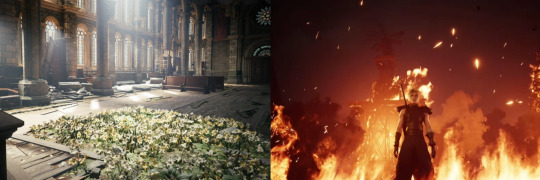
Therefore, Aerith and Sephiroth represent two different dualities: life versus death, and truth versus lies.
Part II: Tifa as Sephiroth’s Foil
Tifa’s role as foil to Sephiroth is more understated but nevertheless important, especially in the latter half of the story. Tifa, Cloud, and Sephiroth are the only survivors of the Nibelheim incident, wherein Sephiroth burned the town of Nibelheim to the ground and killed the townspeople after discovering his “Cetra” heritage. However, Cloud’s memories are clouded due to his trauma and the Mako poisoning he endured during the five-year gap between the Nibelheim incident and the start of FF7; and Sephiroth purposefully twists the truth in order to weaken Cloud’s already-fragile mental state. Therefore, the only one who can decipher what’s true and what’s not is Tifa.
Like Aerith, Tifa also represents the truth, while Sephiroth represents lies and deceit. This is very evident in this scene that takes place in the Northern Crater, and again in a scene during Tifa’s journey into Cloud’s mind. In the Northern Crater, Sephiroth tries to convince Cloud that he was never real, and that all of his childhood memories, even the ones he shared with Tifa, were fabricated.
Sephiroth: “You are just a puppet… You have no heart… and cannot feel any pain… How can there be any meaning in the memory of such a being?
What I have shown you is reality. What you remember, that is the illusion. […] Five years ago you were… constructed by Hojo, piece by piece, right after Nibelheim was burnt. A puppet made up of vibrant Jenova cells, her knowledge, and the power of Mako. An incomplete Sephiroth-clone. Not even given a number. …That is your reality.”
Sephiroth, at first, succeeds in convincing Cloud that he is not the “real” Cloud but rather someone who never existed, who never grew up in Nibelheim, and who clung on to fake memories as a means to cope with that fact. However, later in the Lifestream, Tifa expresses a different sentiment:
Tifa: “Sephiroth once said… Cloud made up his memories by listening to my stories… Did you imagine this sky? No, you remembered it. That night the stars were gorgeous. It was just Cloud and I. We talked at the well… That’s why I continued to believe that you were the real Cloud. I still believe you’re the Cloud from Nibelheim…”
By reminding Cloud of a memory they both share–a true memory–she is able to provide a solid ground, wherein Cloud can begin to rebuild his true self after falling for Sephiroth’s deception.
Obviously, Tifa’s relationship with the truth is complicated, and she herself suffers from her own self doubt throughout the story. But in this defining moment, Tifa finally realizes without a doubt what the truth is, and together both Cloud and Tifa are able to reconstruct what really happened in Nibelheim and solve the mystery once and for all.
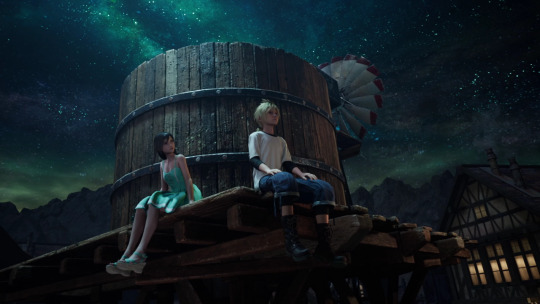
But this duality isn’t simply about truth versus lies. It’s also about hope versus despair. In deceiving Cloud, Sephiroth strips him of all his hope. Cloud is filled with such fundamental despair that he can’t see the truth and believe that he is indeed an experiment created by Hojo. Tifa, in contrast, provides him with hope when she affirms his memories with her own. Separately, Tifa’s resolve to continue the team’s journey without Cloud is another example of her hope in the face of Sephiroth’s despair.
The idea of hope versus despair in Sephiroth and Tifa is exemplified in Kingdom Hearts (although KH is not canonically related to FF7, I think it’s a neat little call back):
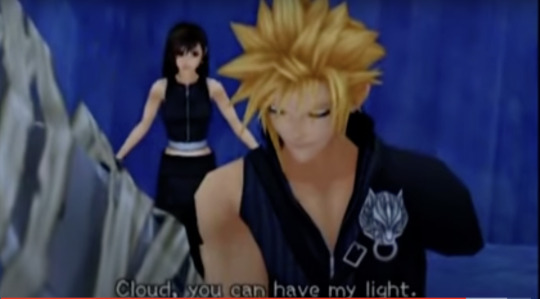
Tifa: “Cloud, you can have my light.”
In Kingdom Hearts II, Sephiroth represents Cloud’s darkness, while Tifa represents Cloud’s light. This is a similar dichotomy to truth versus lies, metaphorically, where Sephiroth is “casting shadows” on the truth, and Tifa is “shedding light” on what really happened. (Okay, sorry for the puns!)
Another duality that Tifa and Sephiroth represent is the dual meaning of reunion in the context of FF7. It’s common knowledge among FFVII fans at this point, but to everyone who’s playing for the first time or who has recently picked up the franchise and not gotten all caught up yet, Sephiroth talks a lot about “the Reunion”. Like, a lot. Sephiroth’s “reunion” is a reference to the Reunion Theory, a scientific theory posited by Professor Hojo that states that Jenova’s cells–once separated from their host, i.e. Jenova–will seek out the main body. This makes everyone who has ever been injected with Jenova’s cells essentially part of a massive Jenova hive mind, with the primary goal to eventually reunite with Jenova.
Obviously, this is a bad thing for Cloud, who was exposed to Jenova cells and is thus connected to Sephiroth.
However, Cloud and Tifa also have a reunion at the beginning of the story–a reunion between friends who haven’t seen each other in a long time. Unlike Sephiroth’s reunion, this is a positive thing. Cloud and Tifa, on multiple occasions, discuss “meeting again” and “finding each other” after so many years apart. Even after they reconstruct Cloud’s memories, he says:
Cloud: “Yeah…… Tifa…… We finally…… meet again……”
Sephiroth’s reunion with Cloud leads him astray from the path; Tifa’s reunion with Cloud sets thing right again. One reunion destroys Cloud’s perception of what’s real, and the other helps him to find the truth once again. Reunion changes meaning with Sephiroth and Tifa, and these opposing definitions of what “reunion” is make Tifa and Sephiroth perfect foils.
Part III: Final Thoughts
Part of what makes Sephiroth such a compelling villain are the striking similarities he shares with the protagonist Cloud Strife. In the original storyboard for FF7, Tifa and Aerith shared a role as the main heroine and the perfect foil for Sephiroth. But even after the role was separated into two distinct characters, the characteristics that made each one of them a foil to Sephiroth remained. For unique reasons, they balance the scales, providing an anchor of “good” to counteract the badness of the story’s main antagonist.
That’s all I have to say about it! I’ve been thinking a lot about Tifa and Aerith’s unique roles in the story as deuteragonists, or dual heroines, and how they both represent antitheses to Sephiroth. I figured I share my thoughts!
176 notes
·
View notes
Text
thinking about how tifa was the only survivor of the nibelheim incident for five years -- how she passed out in the reactor and woke up in midgar. how one day everything was normal and the next she'd lost everything, with nobody there to tell her if it was real. zangan survived, sure, but he left -- leaving tifa alone with her grief, the unlucky survivor of a tragedy that the world insisted never happened.
cloud appearing wasn't just her finding a childhood friend; it was the reassurance that she wasn't crazy, that it did happen, that she wasn't the only one who lost everything -- it was the first confirmation in five long years that not only did nibelheim exist, she didn't have to carry the weight of it alone.
and then he tells a completely different story, and now tifa, who has spent the past five years alone, has her story put in question yet again. not only that, her story is challenged by cloud, who is at this point extremely confident -- versus tifa, who's unsure of herself, who didn't even see most of the things he did (ex: the jenova chamber).
she may always be surrounded by people, but whether it's the crowds of midgar or the camaraderie of avalanche, she is always alone.
245 notes
·
View notes
Text
Interrupted by Fireworks: the illusion over darker realities
Players love the dates for many reasons: it’s the culmination of their hard work with the affection mechanic, a silly interlude after hours of tension, an opportunity to bond with their character of choice. A sweet moment in time isolated from the heavier themes of the game.
But what if I told you that Tifa and Aerith’s dates are not just cute little flashes of fan service? That both dates are part of a broader arc highlighting how the girls recognize, confront, and decide to react to the reality of Cloud’s mental issues?
And what if I told you that “Interrupted by Fireworks” is not just the pretty Big Date song? That “Interrupted by Fireworks” serves as an important tool in threading this arc together and setting our romantic expectations stupidly high so they can be cruelly subverted later?
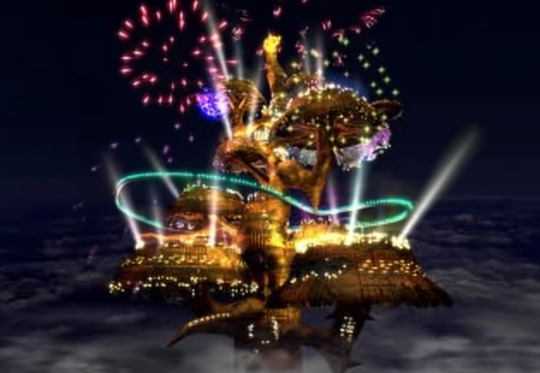
Well wonder no more, as that’s what we’ll be discussing today! Cut for an image-heavy, script-heavy post.
Keep reading
112 notes
·
View notes
Text
Tifa’s interrogation: the flashback at Kalm
The flashback at Kalm represents the first time Tifa truly comprehends the depth of Cloud’s delusions. Some fans see Tifa’s behavior during this episode as complete head-in-the-sand avoidance of the issue.
But… this is a misinterpretation. Tifa isn’t avoiding Cloud’s crisis at Kalm, even if she does opt for subtlety (a necessity, given what transpired at the train station). Tifa tries to use the Kalm flashback to gather evidence to disprove Cloud’s version of events… but she unfortunately discovers that the situation is not so clear-cut.
Tifa’s behavior makes her intentions obvious. As soon as Barret asks Cloud to tell his story, Tifa keeps silent, fidgeting restlessly with her hair. And in contrast with Barret and Aerith, her only dialogue is “…”s:
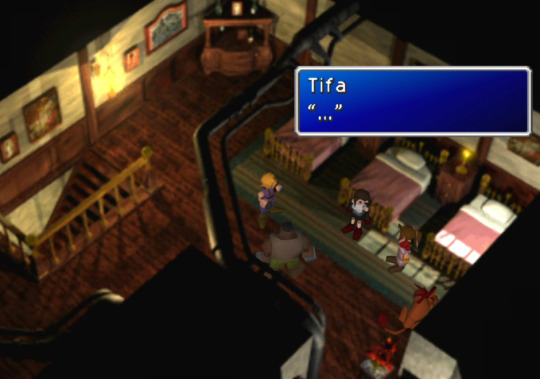
As we know, Tifa hasn’t yet had the chance to hear Cloud’s side of the story: at the train station, he reacted violently when Tifa questioned him; at both the bar in OG and Remake’s Alone at Last, Cloud brushes off her questions. Kalm marks Tifa’s very first opportunity to gather information and understand the nature of Cloud’s inconsistencies. The fidgeting is a sign of Tifa’s anticipation/dread; the ellipses represent her listening intently to Cloud’s story, giving him the space he needs to speak without her contradictory recollections setting him off.
Indeed, Tifa’s very first remark is only in response to an interruption:

Barret: Yo wait a minute!! Isn’t that, um…? The name of Sephiroth’s mother… I remember Jenova. That’s that damn headless spook livin’ in the Shinra building.
Cloud: That’s right.
Tifa: Barret, would you please let us hear what Cloud has to say? You can ask questions later.
Barret: Tifa, I was only…
Tifa: OK Cloud, continue.
Aerith: The childhood friends reunite!
Cloud: …I was really surprised with Tifa.
(watch here)
Tifa abruptly cuts Barret off in a way that takes all three characters aback–why is she so uncharacteristically brusque? Cloud, Barret, and Aerith all verbally react to the outburst, as the devs want the player to notice how unusual Tifa’s behavior is. While a first-time player may not understand her motivations, a seasoned player will: at this moment, Tifa doesn’t care about anything but hearing Cloud’s story and figuring out what’s wrong with him.
Tifa continues to listen in silence until Cloud reaches her house. Suddenly, Tifa asks Cloud about everything he did there:
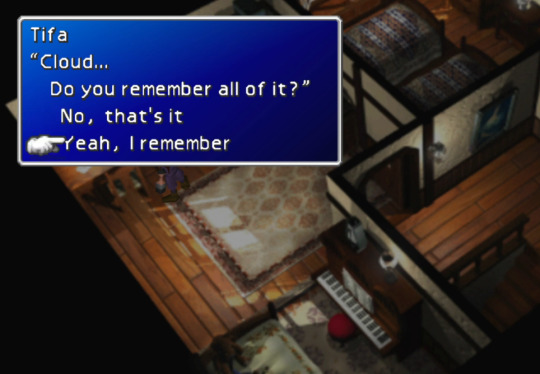
Tifa: Cloud…? Did you go into my house?
Cloud…? Did you go into my room?
Did you play my piano?
(if you check in the drawers to find the underwear…) …Cloud. We’re talking about something really important here.
Did you read it? My letter?
Do you remember what it said…?
Cloud… Do you remember all of it?
(link to the full sequence in Tifa’s room)
These questions may look trivial, like a frivolous Tifa trying to ensure her girlish modesty was maintained five years ago. But it’s the last two questions about the letter which reveal what Tifa is truly doing: she’s subtly interrogating Cloud to determine if he was truly at Nibelheim. If Tifa’s primary motivation is to lessen her embarrassment, then why does she explicitly prompt Cloud to restate the entire letter in front of the entire team five years later?
The full content of the letter is information which Tifa is intimately familiar with, information that only she–or someone who truly was in her room that day–would know. If Cloud doesn’t know about the objects in her room or blatantly bullshits in response her questions, then Tifa has all the more evidence that Cloud wasn’t actually there. But if he does know the answers to these questions, especially regarding something as temporary as a letter, then… what does it mean? That Cloud truly was there, even though Tifa doesn’t remember him being there…? What does that say about Cloud’s memories…? What does that say about Tifa’s…?
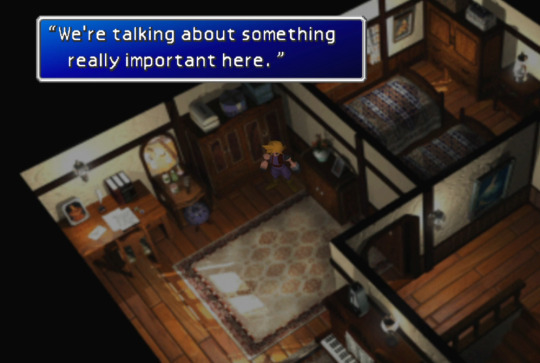
The fact that Cloud passes her “test”–that he knows private details of her room, and gives an accurate account of its contents–leads Tifa to recognize that there is more to Nibelheim incident than just her recollections, and there is more to Cloud’s side of the story. Tifa doesn’t have a full understanding of the situation, and as long as she can’t explain the discrepancies between her memories and Cloud’s, she can’t simply refute Cloud’s version of events. Like it or not, Tifa realizes that the Nibelheim flashback has become a “he said, she said” situation. And who knows… maybe this confident, capable Cloud is correct, and she’s the one who’s wrong?
Now… how do we know that Tifa’s questions about her room are intended to represent her attempts at fact-finding? How do we know that they really aren’t just a trivial cutesy gameplay mechanic to break up the monotony of the flashback?
And the answer is… it’s because Cloud’s answers to these questions are referenced during a critical scene: Sephiroth’s illusion at the Northern Crater.
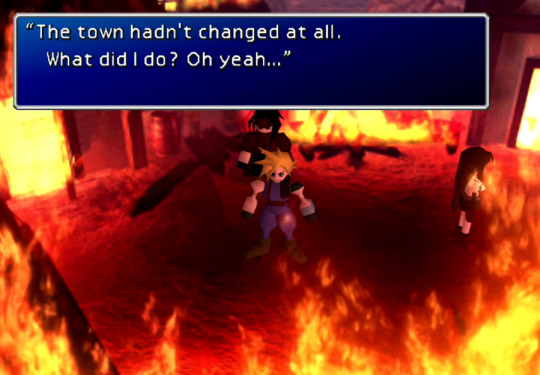
Cloud: The town hadn’t changed at all. What did I do? Oh yeah…
Cloud’s lines are directly influenced by the actions that Cloud took during the Kalm flashback. After the above line, Cloud can make any number of statements:
“I saw my mom. I saw the people in town.”
“Yeah, I went to Tifa’s room. There, I…”
“I played the piano!”
“I looked in the drawers!”
“I read the letter addressed to Tifa!”
Based on how much or how little you did, Cloud will say more (or fewer) of the above statements.
For example, in this player’s Nibelheim flashback, Cloud met his mom and went in Tifa’s room, where he jammed on the piano and raided her dressers. But he never found the letter. So during the Nibelheim illusion, Cloud only makes statements 1-4.
On the other hand, this player’s Cloud experienced everything during the Nibelheim flashback, so Cloud makes all 5 statements during the Nibelheim illusion.
But in this player’s Nibelheim flashback, Cloud went to Tifa’s room but did the bare minimum. Didn’t say “yes” to anything or even see Cloud’s mom. So Cloud only makes statement 2.
With this easily-missed callback, it proves that Cloud himself recognizes the purpose and utility of Tifa’s questioning back at Kalm, and emphasizes how Tifa interrogated Cloud during the Kalm flashback to try and find incontrovertible proof of his presence on that day.
Final thoughts:
>> Tifa’s final question. I’d be remiss if I didn’t mention Tifa’s final question at Kalm. After Barret leaves the room, Tifa speaks up one more time:
Tifa: …… Cloud…? How bad was I when Sephiroth cut me?
Cloud: I thought you were a goner. …I was really sad.
Tifa: ……
There are four ways to interpret this exchange:
The first is how a first-time player would experience it: it’s an exchange which both builds Cloud up as a reliable narrator and suggests that Cloud was relatively indifferent towards Tifa. (Seasoned players will recognize why this moment is played down this way: to build up the shock of the Lifestream reveal, where we learn Cloud isn’t a reliable narrator and that he was deeply affected by Tifa’s injury because he revolves around her.)
The second interpretation is that Tifa’s asking Cloud one more question to confirm if he not only was in her room, but also in the reactor that day–in case you missed visiting Tifa’s house, it’s one last factfinding mission to prove that Cloud was truly there.
The third interpretation is that Cloud’s confidence and accuracy during the flashback leads Tifa to doubt herself; she wonders if the severity of her injuries may be the reason why she misremembers the day’s events. This question alludes to her uncertainty; perhaps she’s performing some factfinding for herself by comparing more of her recollections to his.
The fourth interpretation is that Tifa always knew how badly she was injured, but this is the very first time she learns that Cloud was there when she was injured. Tifa hoped that Cloud would be emotionally impacted by her injury (due to the Promise), which is why she prompts him about it. Unfortunately, his indifferent response is very disappointing. (This could be another reason why her reaction to this moment in the Lifestream is so pronounced and why she brings up the Promise.)
While I think interpretation #1 is definitely what the devs want first-time players to get out of this conversation, I’m not sure if seasoned players are supposed to take #2, #3, #4, or something else away from it. I’ll leave that to you! I hope Remake (or a future Ultimania) gives us some greater clarity here.
>> PS: Undies. Tifa’s not really mad about the underwear–note how her response isn’t something like, “I can’t believe you invaded my privacy like that!” but it’s actually, “Cloud!!! […] …Cloud. We’re talking about something really important here.” Tifa is exasperated that Cloud’s talking about some inane pervy bullshit while she’s TRYING to figure out what’s wrong with him. Come the fuck on, Cloud, a little seriousness here!!
>> PPS: Undies, round 2. Cloud really DID look through her underwear drawer. He wasn’t kidding, because he legitimately uses that fact to prove his existence at Northern Crater. (“I looked in the drawers!”) “I simp for Tifa, therefore I am.” Oh Cloud.
67 notes
·
View notes
Text
The implications of Tifa’s familiarity with Marco
In OG, our first encounter with a clone is in Sector 5, when we’re running around with Aerith. (Link here at 0:14–it’s where we get the infamous “this guy are sick” line!) It’s unclear if OG Tifa has ever met or seen a clone, and even at Nibelheim she doesn’t comment on a single one. (Though to be honest… she doesn’t say a lot in Nibelheim anyway.)
So Remake’s introduction of Marco was a bit of a departure from OG.
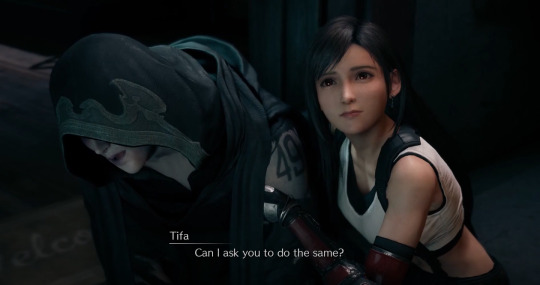
Remake essentially took the 30-second scene from OG Sector 5 and split it up across Chapters 3 and 8, and the encounters themselves were significantly expanded and dramatized to build a “clone arc” with a beginning, middle, and climactic pay-off at Shinra Tower. While I’m 100% confident that these changes were made to adapt the clone storyline to a full-length, Midgar-only game, the implications of Tifa’s new involvement are fascinating and may have an impact beyond Part 1.
Unlike the ambiguity of OG, Remake gives us definitive proof that (1) Tifa is not ignorant to the signs of “clone behavior”–we see her care for Marco when he is deep in the throes of incoherence and delirium. We’re also told that she checks in on him now and then to make sure he’s okay–so (2) Tifa is familiar with the incurability and tragedy of this condition.
In OG, we are shown that Tifa will see these same symptoms of incoherence in someone else:
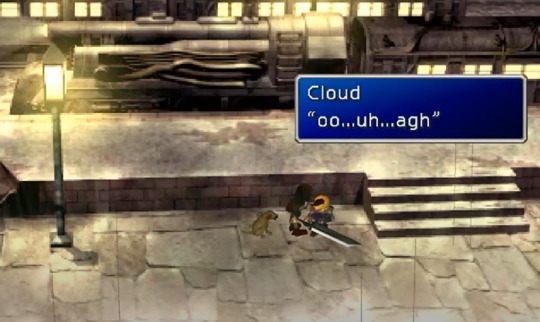
However, unlike Marco’s tragic condition, Cloud’s mysteriously cures itself:

Until she asks him a simple question about the past and it causes him to freak the f out. He terrifyingly, dangerously, uncontrollably flails his sword around while she can only cover her mouth in fear (pay close attention to her hands and body language in the next image–she sees his odd behavior and reacts to it):
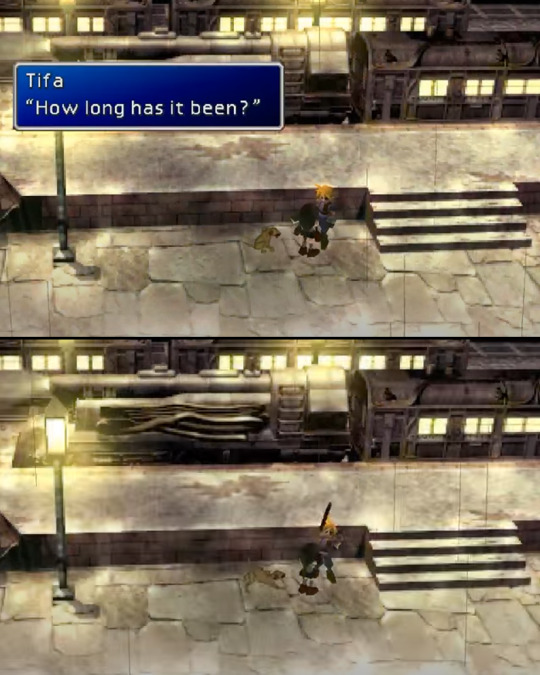
He finally stabilizes in a peaceful, coherent-but-confused state:
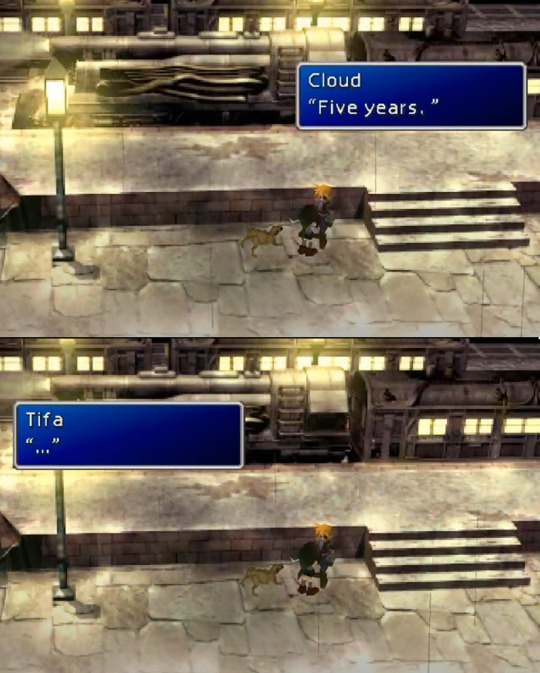
And Tifa is reluctant to broach the topic further, lest he destabilize once more.
(Entire scene here.)
While the body language in the flashback scene is easy to miss, Tifa’s fear and confusion are undeniable. Her motivations for staying silent on Cloud’s disconcerting contradictions are obvious: not only does she not want to chase him off before she can figure out how to cure him, but the one time she did ask him something, his response was uncontrollable and inadvertently dangerous. This scene illustrates the high stakes Tifa thought she’d be playing with if she broached the past with Cloud again.
In Remake, Tifa’s familiarity with Marco can lend her additional insight during this pivotal moment with Cloud, and increase the stakes even further. When she sees an incoherent Cloud at the train station, (1) Tifa recognizes this as “clone behavior” and (2) likely worries that Cloud has the same tragic, incurable affliction as Marco. So when Cloud magically fixes himself, it must feel like a miracle to her. Of course she would likely want to do anything to keep him that way. So if Cloud seemingly regresses–violently or otherwise–when prompted about their past together, Tifa probably doesn’t want to push her luck. After all, what if this is the time he becomes permanently Marco-fied?
The devs are well aware of common anti-Tifa talking points, and used both Remake and Trace of Two Pasts to systematically debunk dozens of them. It seems highly likely that Remake intends to use Marco to refute yet another talking point: “why didn’t Tifa ‘tell the truth?’”
—
(shoutout to @terra-fatalis who encouraged me to get back on my ffvii shit and has an amazing tumblr of their own!)
143 notes
·
View notes
Text
One of my favourite moment of Tifa. It's not easy to openly admit your ambition and your flaws out loud like this, especially for someone like Tifa. I'm glad she has Cloud here.
Tifa being honest with cloud
102 notes
·
View notes
Text
I'm making gifs of the Gold Saucer arrival and I just can't get over how Cloud focuses on Tifa in the crowd 😭
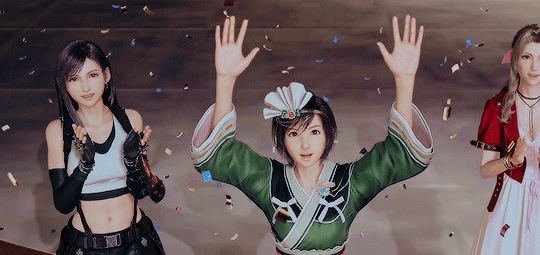
378 notes
·
View notes
Text

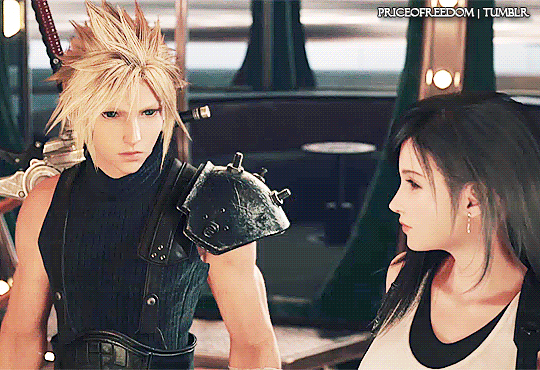

Cloud and Tifa barely being able to look at each other after their date (✿◠‿◠)♡
Requested by anon!
381 notes
·
View notes
Text
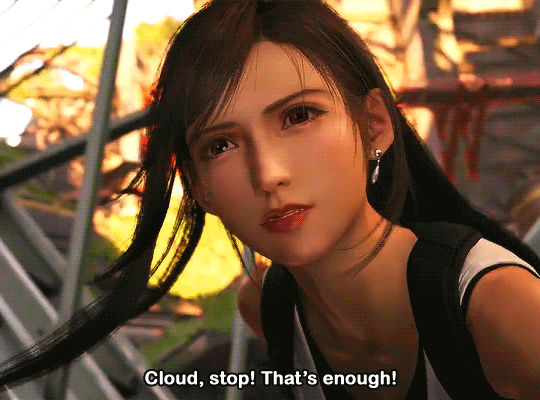
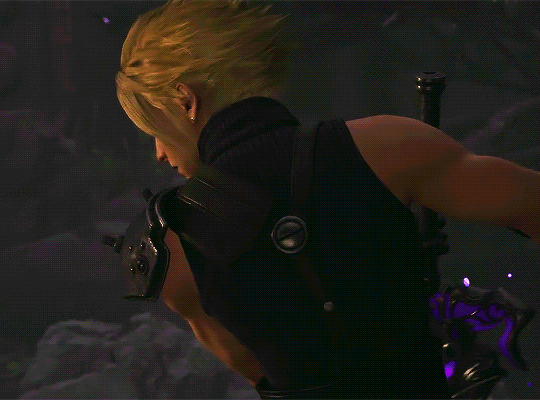


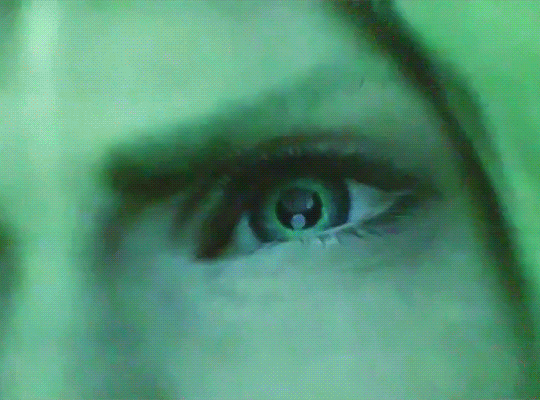


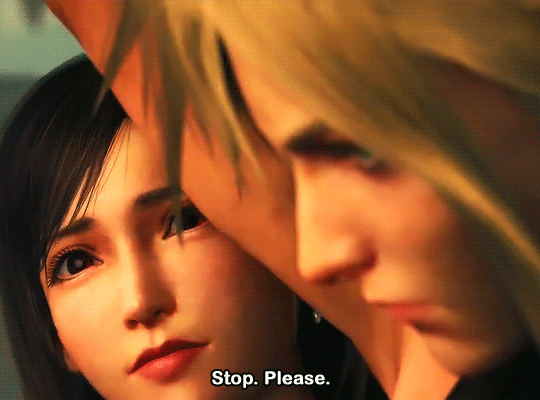
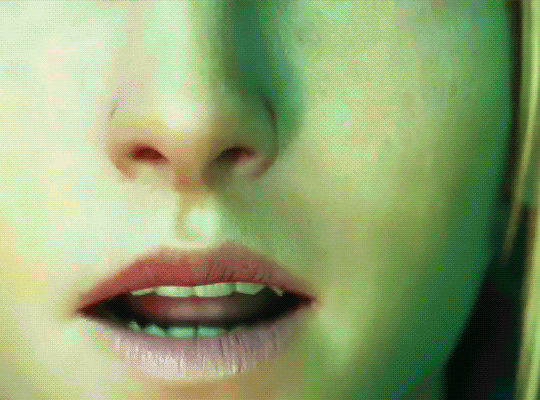

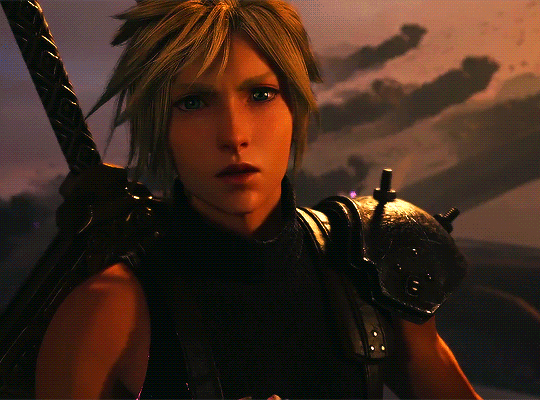

cloud: weehee silly time
tifa with a spray gun: DOWN BOY
312 notes
·
View notes
Text
11 notes
·
View notes
Photo
This combines with Rebirth, wow, Sephiroth really has a bone to pick with Tifa huh. He's tried to kill her like, 3 times already.

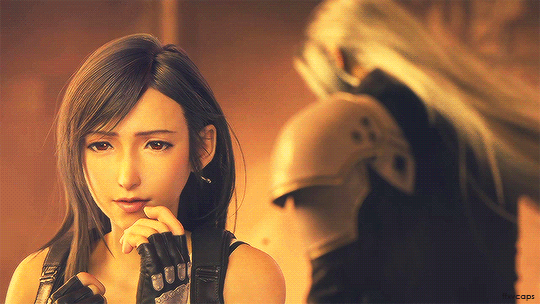

FFVII: Remake → Tifa!!
319 notes
·
View notes
Text
Northern Crater Illusion (Tifa version)
I know people's been saying something about this part in like forever especially in the OG but I finally get the courage and spite to write my own take. That's what I get staying on twitter I guess.
(You best believe I will post this there but on concentrated amount - character limit is only the blue checkmark's friend on that island.)
Most specifically I want to have a closer look on how Sephiroth pulled his attack using this *truth* that he and Tifa share and how this translates to Tifa's own personal conflict with Sephiroth himself.
Yeah, got so tired in that Sephiroth hates Tifa because of her interference to his plans for Cloud and the only one who can fix him takes.
No, fam. That's what the Rebirth seem to imply to y'all but Sephiroth already hates Tifa in OG separate from Cloud. (Or does he?). Heck, him leaving his Masamune beside her father's corpse is a literal taunt daring her to go after him and use his weapon to inflict damage to his person. This is before Cloud made himself known by stabbing him due to his own grief by the way.
Even with all this, we see he doesn't really seem to care to remember the name of who killed him until Cloud had to point it out in Junon.
CLOUD had to point it out. His KILLER has to tell him his name just to make him remember.
Tifa though?
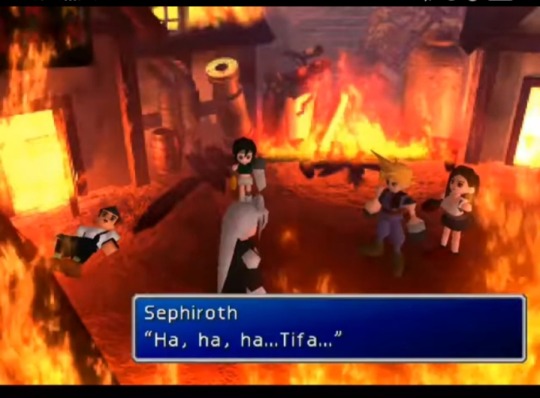
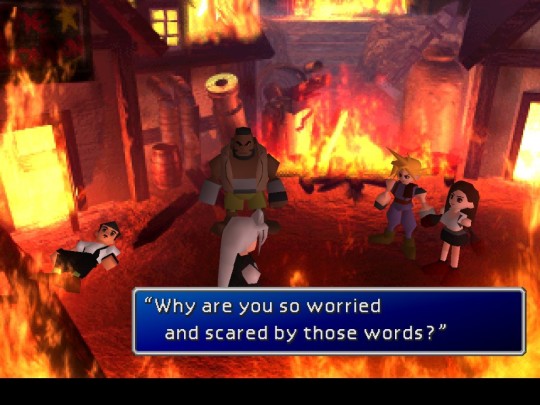
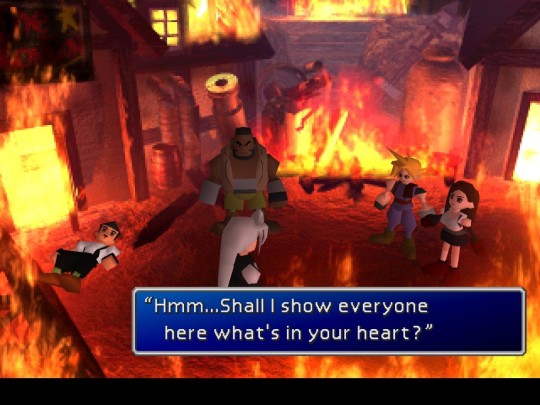
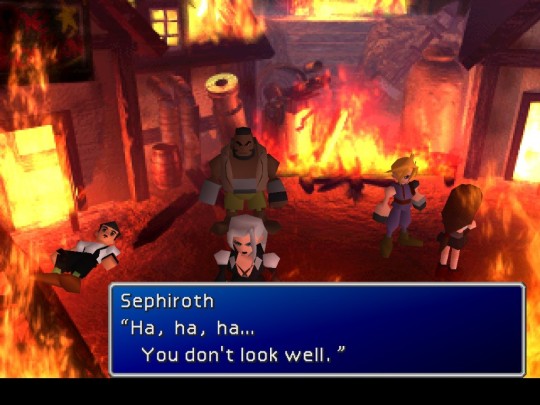
Getting talked to so intimately with faux kindness - the very same treatment he now shows Cloud in Rebirth, imagine that.
Now let's also remember that this is the OG and therefore any trappings of Rebirth's new plot doesn't exist here because this is the beginning of it all.
Anyway, I revisited this scene because of an itch urging me (it's the spite) and a thought suddenly occurred to me.
If we remove Cloud's side and trappings in that part of the illusion (basically all things Cloud) and look at this from Tifa's perspective as a standalone thing for her own character, it paints a very clear picture of Sephiroth attacking her.
People always miss this because Cloud once again overshadowed Tifa's own trauma and unresolved conflict with Sephiroth as the one more openly attacked in this scene.
Let's look at Sephiroth's lines:
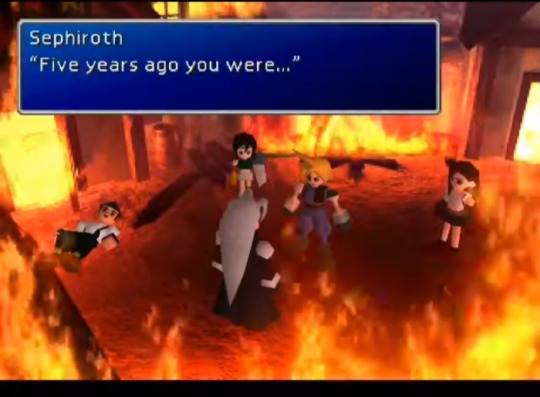
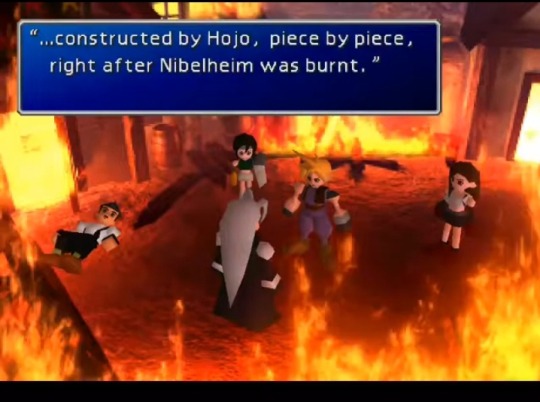
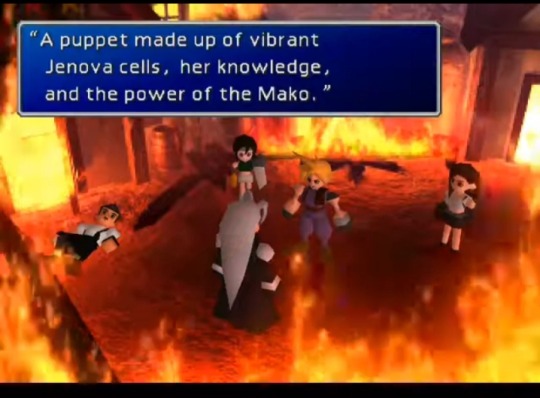
The lie has been set. Obviously Tifa won't let this unanswered if she could help it. So this is her response:
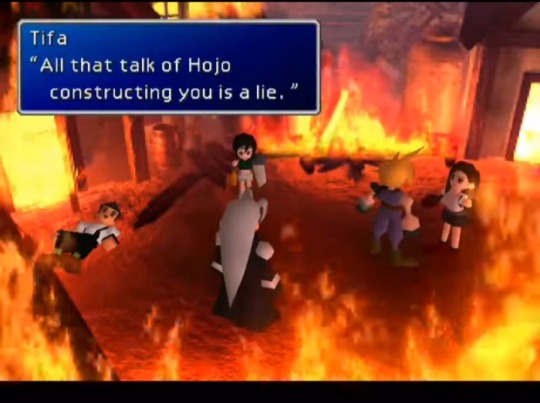
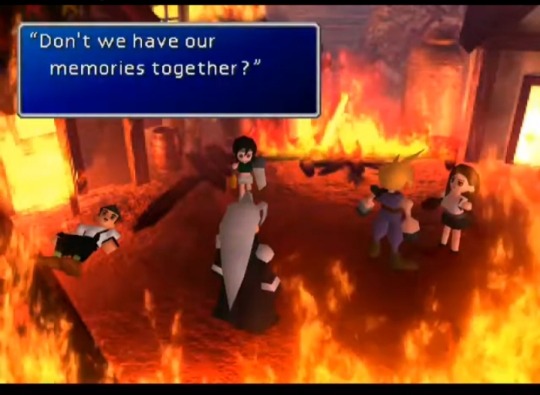
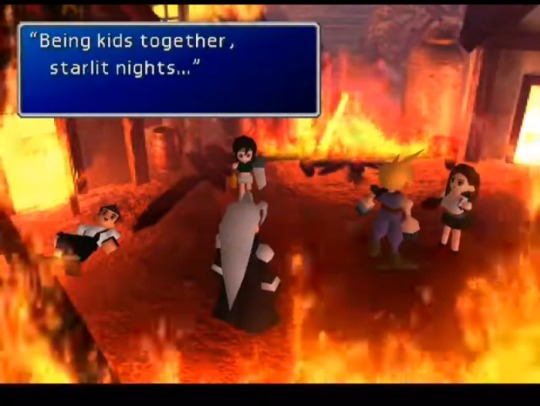
With Sephiroth's response to this being the first images I posted above.
It's been made clear how extremely pressured Tifa was at this scene especially when Cloud reveals he hinges all his faith in her while suffering her own trauma again AND attacked by their enemy.
It wasn't just Cloud Sephiroth gaslighted in this scene.
That's what this part is trying to show us and regardless of who gets attacked here the outcome is the same: Cloud is just an illusion created by Jenova using memories of people, most especially Tifa.
Sephiroth doesn't hide his attacks to her at all and it astounds me how everyone who played this game back then believed only Cloud was dealt a great mental blow. (Most of y'all are kiddies I guess that also tracks.)
Tifa actually had it much worse!
She was so overwhelmed from it all she accidentally made the wrong move of answering Cloud in the negative:
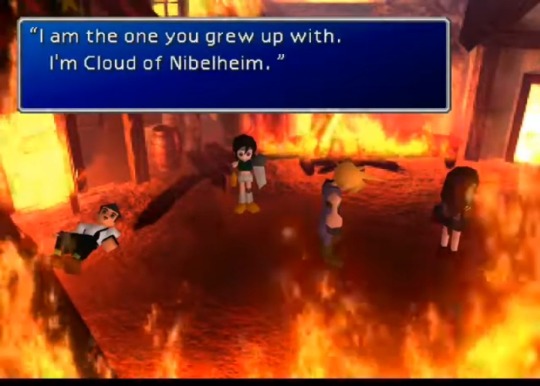
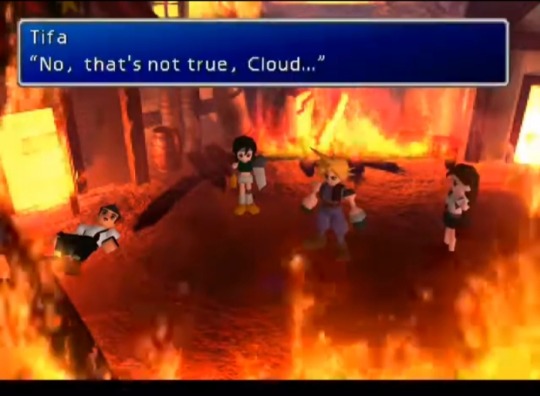
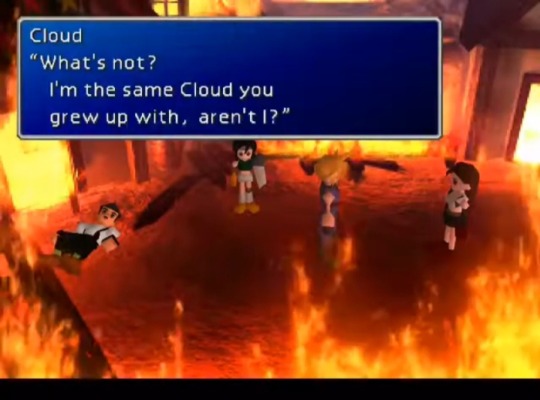
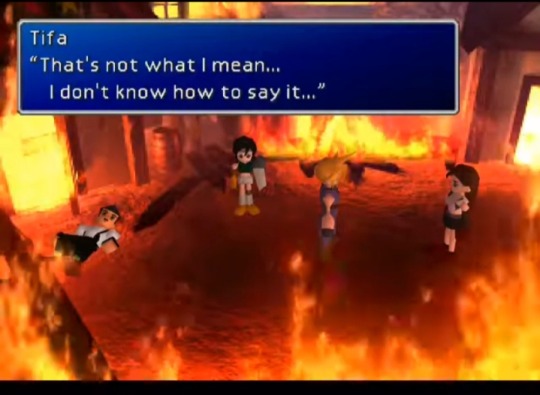
When I said she's under tremendous pressure it isn't just because of reliving her trauma and carrying the burden of Cloud's mental state alongside her own increasingly damaged psych.
It is the fact that Cloud wasn't the only one relying on her affirmation - or lack thereof - to validate which one was speaking the "truth". Sephiroth was also using her to confirm his claims and he knew very well he's got the upper hand to the "truth" she has known, all the while gaslighting her that it IS the only truth. There's even a picture to prove it!
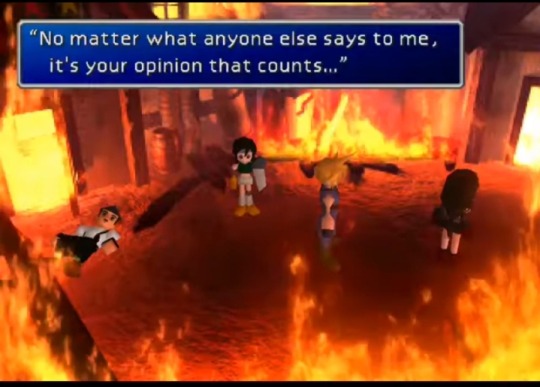
This is not the picture but this is also that picture.
Of course, Sephiroth made sure to include her into the story. She's not part of it simply because she was there but because according to his statement..... her memories are part of Jenova's knowledge used to make *Cloud* - the failed clone.
The Cloud who by Seph's own words is just a construct of Hojo after Nibelheim's burning. A clean slate born from collective memories thanks to Jenova.
The sheer implications behind these statements are our clue to the underlying conflict that exist between Tifa and Sephiroth outside of Cloud. That the hatred is not a one-sided thing, and just because it isn't readily understood why it exist doesn't mean it isn't present.
Sephiroth drives the knife further to twist the mental wounds even more. Tifa being the one to carry the most burden of all:
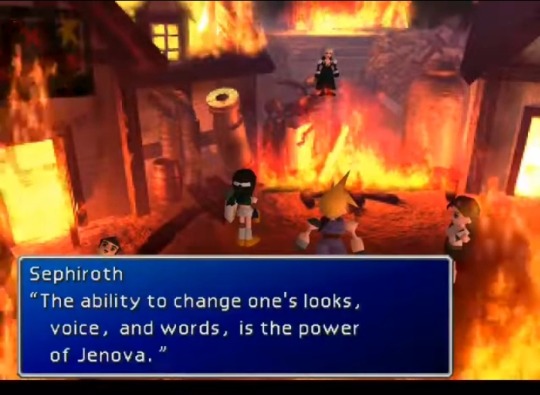
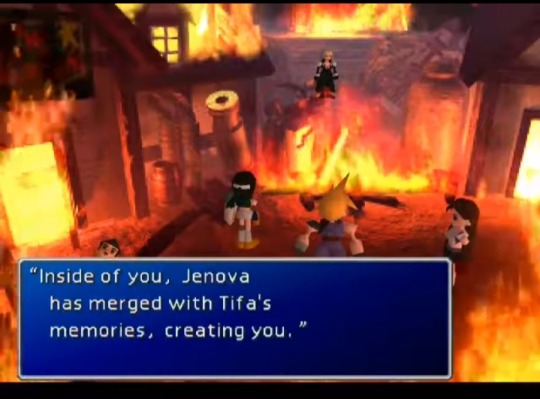
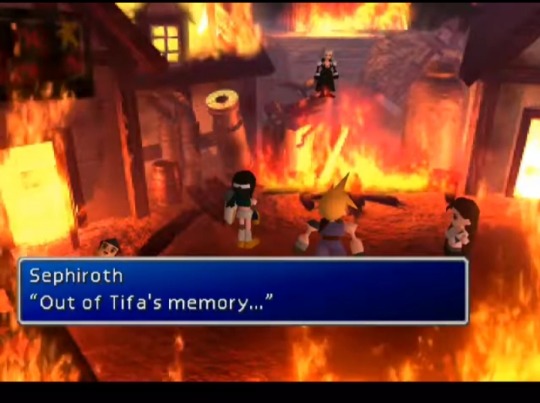
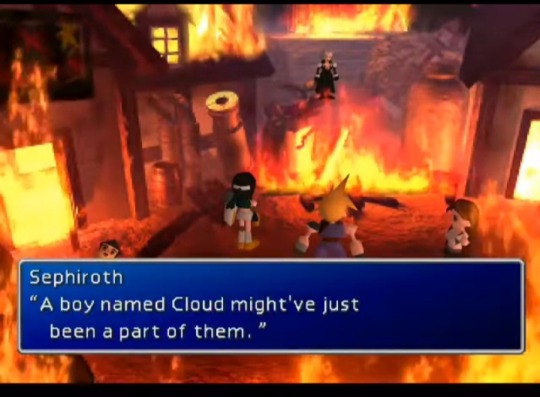
Now here's a pretty interesting thought: a girl who is just plain ordinary is important enough to have Jenova's effort in molding a clone after her own desires - her childhood friend. Sephiroth is basically admitting he's got one special clone just for her. (He even gave her one in Remake but that's a slightly different story).
Ignoring the fact that Cloud is not a construct it still makes you wonder: why use her for that lie? Why her in particular?
(We are using Tifa as our center focus for this so I'm going to exclude the "she's Cloud's childhood friend reasoning. This is not about him.)
Then it can be answered if you look at it as his own way of tormenting Tifa - using a clone imbued with her memories.
A mutual on twit said that maybe because she's the one who the group trusts the most, however more than half the party wasn't there yet when *Cloud* (who Sephiroth consistently claims is just his clone) appears in front of her on that bench.
AVALANCHE as it was at that point doesn't have anyone else with a connection to Cloud.
So it goes to show she is the target of said clone's manifestation.
That is, if we believe the lie Sephiroth weaved and take it as he said it at face value, which definitely is what his claim would be to Tifa who can't refute it, especially because apparently *Cloud* really did show signs of "clone behavior" when they first met but the tech limit back then doesn't show us how it should be like to its fullest extent.
(As someone points out here: https://www.google.com/amp/s/hartofhearts.tumblr.com/post/665525778591694848/the-implications-of-tifas-familiarity-with-marco/amp) My phone isn't cooperating 😭

How could she when his "truth" matches exactly everything she knew five years ago? How could she say he's wrong when Cloud's behavior was suspect when they met for the first time in years after Nibelheim (and for her part after he left for SOLDIER)?
She tried refuting but it's clear she has her own doubts about him as well, as she couldn't continuously defend Cloud from Sephiroth's persistent claim about his current identity.
By gaslighting Cloud he doesn't exist, he also gaslights Tifa into thinking her real childhood friend is gone and it's all just in her head now.
Sephiroth KNEW so well she wanted to see Cloud five years ago but didn't see him and use that to his own advantage. It's why this is so effective a gaslight to both.
As far as Tifa knew, the last time she saw Cloud was when he left to join Soldier. This Cloud's fate is unknown to her, maybe he died or maybe he forgot about her and all such insecurities Sephiroth could use with that solidify his claims that he was all " Aw, poor Tifa. Waiting for someone who never came. Here, Jenova's made you a clone with your memories of that boy to play with you."
That's what it looks like if we only see this scene through Tifa's eyes.
Again, taunting her in the same vein as when he first did leaving Masamune besides her father's body.
Why would he do so if Tifa didn't caught his attention in the first place?
Sephiroth is clearly playing around with her and toys with her emotions just as clearly as he attacked Cloud.
He just couldn't break her like he could him no matter how hard he tried because Tifa's mental fortitude is so strong.
#tifa lockhart#sephiroth#cloud strife#ff7#sephti#I can rewrite FF7 with Tifa as protagonist and nothing will change#except Sephiroth's manipulation can't do shit to her#she's just THAT strong#and her narrative is that interchangeable with Cloud#heroine behavior fr fr
18 notes
·
View notes
Text

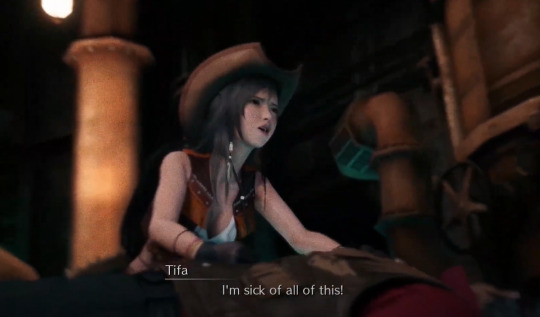

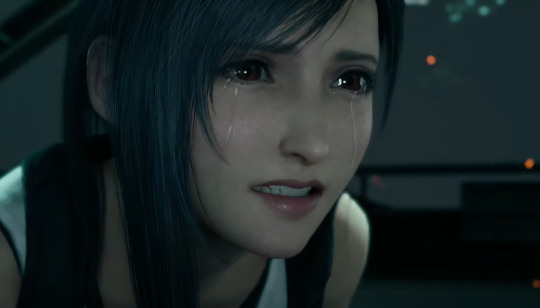

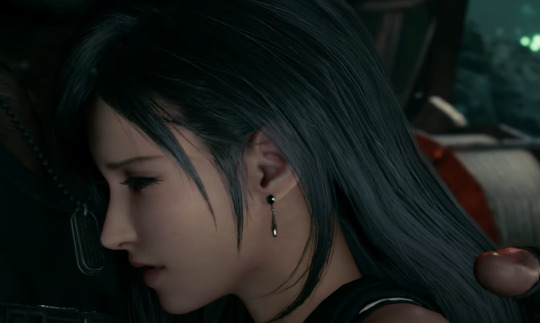
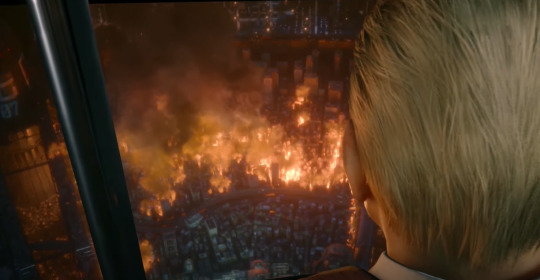

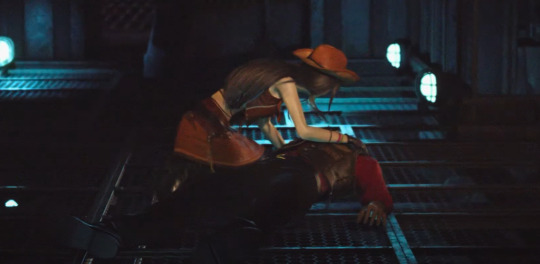


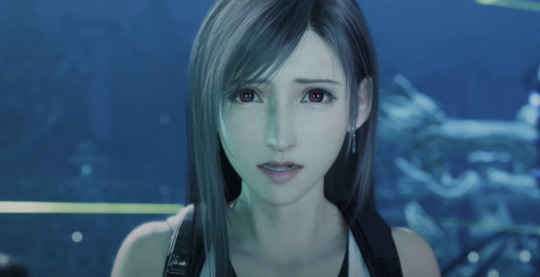
STOP HURTING MY BABY
16 notes
·
View notes
Text
Honestly? I don't mind Tifa has fan service outfit. I, however, do mind if said outfit is UGLY and the new bunny outfit is fucking hideous!
#tifa lockhart#final fantasy vii#free my girl from those cheap ass outfits#you can design sexy outfit that's still classy y'know???#those outfits are definitely designed by a man cos wtf is that?????#not just Tifa's bunny outfit but Aerith's dress too#All 3 of them look bad#I'm begging y'all to do better#I know design outfit is hard but y'all have been doing these for years#literally no excuse
1 note
·
View note


